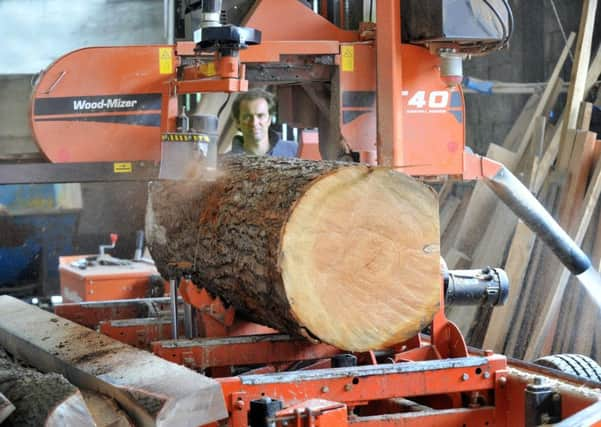Farm of the Week: Timber to the fore at Moors farm


Pigs, cattle, haymaking and holiday cottages provide income in the farm’s name while the timber now contributes the lion’s share of revenue through its separate entity. Henry runs two Wood Mizer sawmills and a quality kiln for drying the timber. He’s tapered his farming around the business that now earns him a better return.
“My father, David, bought the farm having come out of the family textile mill business in the West Riding. He’d had 30 acres where we used to live in Burley in Wharfedale. My parents David and Gillian now live in Sinnington.
Advertisement
Hide AdAdvertisement
Hide Ad“When I came back to the farm from a year travelling around the world in 1997 we had cattle and sheep, adding pigs on my return. We still have 1,200 pigs at a time on a B&B basis for John Mosey. They come in at 7kg and go to finishers at 50kg. They’re here for a nine-week run. I’ve no sheep at the moment and bought cattle as stores last autumn at around 14-months-old to run on for finishing.
“I make a lot of silage and hay. I’ve kept 60 acres that I’m taking hay off this year. The trade for hay through Ruswarp Mart and privately was particularly good last year. I may well buy stores again this autumn, if so I will use some of this year’s hay. I’m juggling everything at the moment trying to get the right balance. A friend is renting 20 acres for taking silage off and another is grazing his cattle in the short term.
“Our sheep flock ran to 250 Mule X Texels but the time they were taking up didn’t equate to the hours I was putting in. I still love my farm and keeping livestock but farm largely on my own. I aim to be professional in all I do but one of the problems with keeping sheep would be that I might organise myself to do something with them on a specific day and then a customer would call needing timber and it would take me another week to get back to either the sheep or risk losing the customer.
“We used to have a herd of 40 Aberdeen Angus breeding cows. The grassland here is good and ideally I’d like to start another pedigree herd, probably 20-30 Belted Galloway breeding cows as they are hardy and low maintenance.”
Advertisement
Hide AdAdvertisement
Hide AdPrior to taking on the farm Henry was a forestry apprentice at Castle Howard Estate. Unbeknown to him at the time, his experience alongside forester Stan Craggs and the rest of the team provided him with a springboard into sawmilling, kiln drying and manufacturing.
“I’d always had a love for timber and had operated a Wood Mizer sawmill at Castle Howard. When we started getting the holiday cottages ready for visitors I decided to have a go at milling up a few pieces of oak for beams and lintels and it’s all grown from there.
“I bought a very basic Wood Mizer, but as the trade grew I sold the Angus herd in 2011 and purchased the second Wood Mizer, an LT20, and the kiln. I specialise in oak, but also mill other species - pine, beech, ash and monkey puzzle. The kiln subjects the timber to a very high humidity, which is then slowly dried out and monitored by computer with continuous moisture readings. We have kiln-dried timber available to order and the kiln can be hired to dry customers’ own timber.”
Supplying timber for structural needs, garden furniture, tables, chairs and pub bars are just some of Henry’s range.
Advertisement
Hide AdAdvertisement
Hide AdAlthough he has 50 acres of woodland at Grange Farm he doesn’t use his own in the timber business.
“All ours is mature Scots Pine and a bit of Larch. I source most of my timber from Scotland and purchase small amounts from between here and York. Oak is 80 per cent of what we do because it is so in demand. One thing I don’t get involved with is buying packs of timber to sell on. I only supply materials I’ve milled and I love choosing the right quality and type of timber that each job requires.”
Contract milling also takes Henry away from his livestock from time to time and is another reason why he’s streamlined his farming operation.
Sourcing of timber can have benefits. Henry was in Poland last week enjoying their local liquor.
Advertisement
Hide AdAdvertisement
Hide Ad“One of my oldest pals took me around the country’s oldest vodka distillery. They have dismantled these huge vats made of oak where vodka has been sat for 100 years. We were looking at whether the reclaimed oak would be something great.
“It was a fun project to go over and is nothing like what I do the rest of the time. I have a few customers who are excited about the prospect of using it and the outcome is that we are now about to import it. Seasoned oak is particularly popular among interior designers right now.”